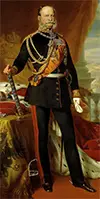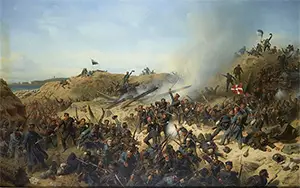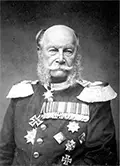Wilhelm I: First Emperor of Germany
Wilhelm I was King of Prussia and Emperor of Germany for more than two decades in the late 19th Century. 
He was born on March 22, 1797, in Berlin. His father was the reigning King of Prussia Frederick William III, and his mother was Louise of Mecklenburg-Strelitz. As the second-oldest son, young Wilhelm was not expected to succeed his father as king. That honor belonged to his older brother, Frederick William. Wilhelm did serve in the Prussian Army, fighting against French troops during the War of the Sixth Coalition. He was a battalion commander under Gebhard Leberecht von Blücher at the Battle of Ligny and the Battle of Waterloo. After the war ended, he took on more diplomatic roles, including accompany his sister Charlotte to Russia so she could marry Emperor Nicholas I, while maintaining his military career, advancing through the ranks and becoming a corps commanding general in 1825. Wilhelm had fallen in love with a Polish noblewoman named Elisa Radziwill but was forced by his father to abandon that relationship in 1826. Instead, three years later, Wilhelm married Princess Augusta of Saxe-Weimar. They had two children, both of whom lived into adulthood: Frederick (1831) and Louise (1838). King Frederick William III died in 1840, and his oldest son succeeded him, becoming King Frederick William IV. Wilhelm then became heir apparent. He was a loyal military commander during the Revolutions of 1848, using force to put down uprisings. He also commanded Prussian forces in a conflict with Denmark over ownership of the duchies of Holstein, Lauenburg, and Schleswig. Denmark retained control over all three. Frederick William IV suffered the first of a number of strokes in 1857. The following year, William took on the role of Prince Regent. He was largely in charge of running the government from that point on, assuming full command as King Wilhelm I when his brother died, on Jan. 2, 1861. He survived an assassination attempt soon afterward and then crowned himself king at Königsberg on October 18. Wilhelm wanted an increase in funding for the army and the Landtag (representative assembly) wouldn't approve one, so the king turned to Otto von Bismarck, making the crafty politician Minister President and tasking him with getting the necessary approval. Bismarck did just that, in one of many examples of how persuasive and savvy a political deal-maker he really was. Prussia put that newly reformed and newly financed army to good use in two wars in the 1860s, against Denmark and Austria. Prussia proved victorious in both. 
King Frederick VII, who had retained control of the three duchies in the 1850s, died in 1863. His successor, Christian IX, agreed to a new constitution that incorporated Schleswig into Denmark fully, despite the large number of German-speaking people living there. Prussia objected, and the two powers went to war again; this time, Prussia had Austria on its side, whereas Denmark was on its own. The Prusso-Danish War or Second Schleswig War was much more one-sided than the previous affair. The allied force took the symbolic Dannevirke, a system of fortifications in Schleswig-Holstein that had stood for centuries. Despite sporadic Danish advances and successes, the Prussian side achieved victory in a matter of months. The Treaty of Vienna, agreed to in October 1864, gave Prussia control of Holstein, Lauenburg, and Schleswig to Prussia. Austria won the right to a joint occupation, which proved problematic in the end. Two years later, the former allies went to war with each other. Bismarck had made an alliance with Italy not long beforehand, and Italy agreed to come into the war on the side of Prussia. Austria could count on no other major powers coming to its aid, either because of existing agreements or because of a need to settle things at home. Prussia was much better prepared to fight the war than Austria was. Prussia had modernized its railway and used it successfully to transport troops quickly from one theatre to another. Prussian weapons were also superior to Austrian weapons. Prussia proved this repeatedly during the seven weeks that the war lasted. The fighting stopped in late July. French Emperor Napoleon III acted as mediator, securing the Peace of Prague on Aug. 23, 1866. Austria agreed to the dissolution of the German Confederation and to the cession of Hesse, Hanover, Holstein, Nassau, and Schleswig. The swift, stark victory proved Prussian dominance in the realm of German-speaking states. Gone was the Austrian preeminence that had existed since the days of the first Habsburg emperors. Wilhelm and Bismarck took advantage of the changing of the guard and set up a new collection of German states, the North German Confederation. Prussia controlled the presidency permanently. The first president was Wilhelm. He was also head of the armed forces at times, and he proved his mettle in the short war against France, in 1870. His army's victory in the Franco-Prussian War left no doubt as to which European power was supreme. 
Wilhelm climbed ever higher on the political ladder, achieving the title of Emperor, when he proclaimed the German Empire in the Hall of Mirrors in Versailles, on Jan. 18, 1871. The empire excelled, growing in prestige and stature with Wilhelm and Bismarck at the helm. The emperor was not without his enemies, however. He survived two assassination attempts as emperor. In May 1878, a man wielding a revolver shot twice at Wilhelm while the emperor was riding in a carriage in Berlin. The very next month, another man fired two shots from a shotgun at the emperor, again in an open carriage. Wilhelm avoided being hit by the revolver bullets, but one of the shotgun shells did hit him and he made a narrow recovery. The revolver-wielding man was convicted of attempted assassination and executed; the man who fired the shotgun died of a self-inflicted wound not long after his assassination attempt. 
Keeping his eye on external affairs, Wilhelm traveled to Russia in 1878 in an attempt to repair relations with Czar Alexander II. Just two months later, Wilhelm agreed to the Dual Alliance with Austria-Hungary, mending in totality the trust broken by the war between Austria and Prussia not two decades before. One of Wilhelm's lasting achievements in the latter years of his life and reign was the Berlin Conference, organized by Bismarck. One prime result of that international gathering was the enlargement of the German empire overseas. Emperor Wilhelm I lived a long and eventful life. He was 90 when he died, on March 9, 1888, in Berlin. His son, Frederick succeeded him. |
|
Social Studies for Kids
copyright 2002–2025
David White




